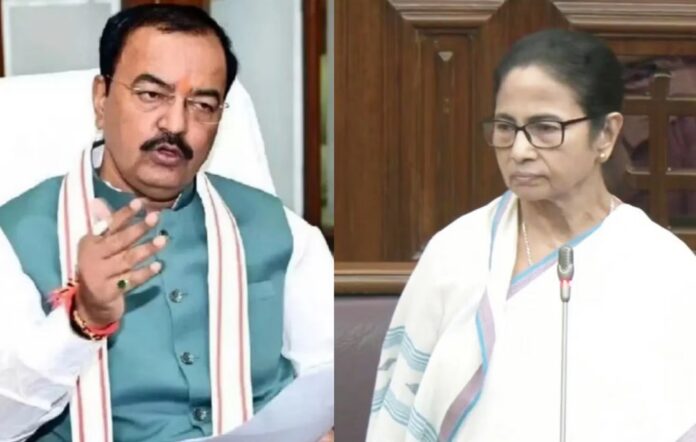Uttar Pradesh Deputy Chief Minister Keshav Prasad Maurya on Wednesday launched a sharp attack on West Bengal Chief Minister Mamata Banerjee, alleging that Hindus in the state are being crushed between rising Muslim fundamentalism and what he termed as an “anti-Hindu autocratic rule.”
Referring to recent violent protests in Murshidabad on April 11 against the Waqf (Amendment) Act, which left three dead and several injured, Maurya painted a grim picture of the law-and-order situation in Bengal.
Taking to X (formerly Twitter), Maurya wrote:
“The Hindus of West Bengal, once known as the ‘Bhadralok’ of the country, are being crushed between two sides. On one side is the challenge of Muslim fundamentalism and Bangladeshi infiltration, and on the other side is the autocratic rule of Mamata Didi, which is absolutely anti-Hindu.”
🔥 “Extreme Appeasement Politics” Accused
Maurya accused Banerjee of pushing appeasement politics to the extreme, alleging that this has led to a rapid and dangerous demographic shift in the state.
“Earlier the leftists welcomed infiltrators like sons-in-law. Now Didi has taken that appeasement even further. Vote bank politics has spoiled the social balance and caused an ultra-rapid demographic change, damaging Bengal’s security, resources and social fabric,” he claimed.
He warned that the state’s cultural and social ethos is being hollowed out due to illegal immigration and open political support to fundamentalist elements.
🧿 Cultural Identity Under Threat?
Highlighting Bengal’s historic legacy, Maurya said:
“Bengal, once the land of saints and nationalists, is now in the news not for harmony, but for violence. The shift from being a beacon of culture to a hub of communal tension is deeply alarming.”
He reiterated that the combination of unchecked infiltration from across the border and political patronage of radical elements is weakening West Bengal from within.
📍 Context: Waqf Protests & Political Climate
Maurya’s remarks follow unrest in Murshidabad, where violent protests over the Waqf Amendment Act led to casualties and destruction of property. The law continues to generate political and religious tensions, especially in minority-dense areas.
As the political climate heats up ahead of the 2024 Lok Sabha elections, statements like Maurya’s reflect the growing polarization and communal rhetoric in state and national discourse.


